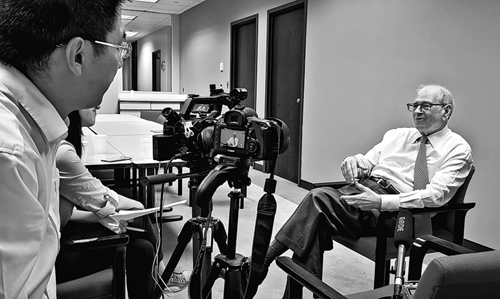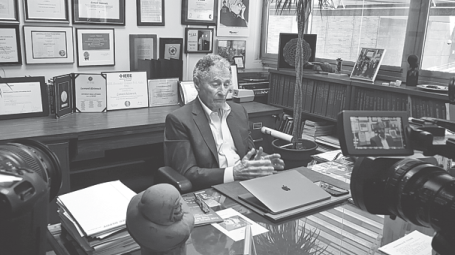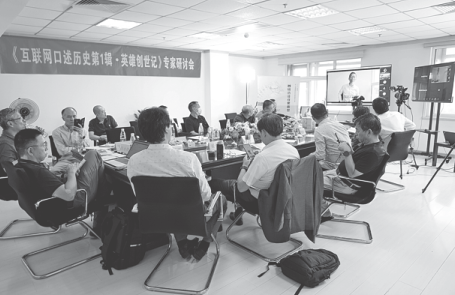Tracking the internet pioneers
Researcher interviews those who drove the development of the technology that has shaped our modern world, Cheng Yuezhu reports.

Witnessing the constant transformation of the internet, researcher and internet expert Fang Xingdong thought it was high time to record the changes and the stories of the pioneers who drove them.
In 2007, he launched the Oral History of Internet project. Since then, he and his team members have been traveling around the world, visiting the key figures in the development of the internet, to film and record their conversations.
"Like a group of miners we dug out the gold from the mountains. This job is almost like manual labor. We have to travel around the world with equipment, and it cannot be done without great physical strain," Fang says.
Despite the toil, he found joy working on the project, gaining local support wherever he went and gathering great stories via face-to-face conversations, most of which took place inside the homes of the interviewees.
By the end of 2019, the team completed the first phase of the project. After interviewing more than 500 internet experts from more than 50 countries and regions, the team collected and compiled around 2,000 hours of video recordings and 10 million words of transcript.
This April, the first of the project's findings was published by CITIC Press Group, comprising eight volumes of interview transcripts with eight computer scientists who have played crucial roles in the development of the internet.
According to Fang, this set of books was created in strict accordance with academic rigor, but the language used is straightforward and comprehensible, and therefore the books are suited to all age ranges including primary school students.
These interviewees are closely involved in the invention of the internet, such as American computer scientists Lawrence Roberts, Leonard Kleinrock, Vinton Cerf and Bob Kahn, all of whom were honored by the United States National Academy of Engineering's Draper Prize as the founding fathers of the internet.
The book set also presents computer scientists from other parts of the world who have also made significant contributions, especially to their respective countries, including Kilnam Chon from South Korea, Louis Pouzin from France, Werner Zorn from Germany and Hu Qiheng from China.
Fang says that his first draft list of interviewees included mostly internet experts prestigious in the industry, but until this day, these names remain largely unheard-of among the general public-even to himself.
Despite working in the internet industry for over 20 years and founding the think tank ChinaLabs, undertaking this project has revealed to him how limited his understanding of the internet really was.
"At the time, I thought I was familiar with the internet, because I was there when it first came to China. But the internet already had a history of 25 years abroad, so I didn't know much about how it came into being and developed at its infancy, and many pioneers told of the details in those early years," Fang says.
Working on the project, he understood fully that the prosperity of the internet today could not have been achieved without these scientists' dedication and contributions, who strived not for personal profits, but for a simple goal of connecting first the computers, and then people and communities.
Zhong Bu, associate professor at Pennsylvania State University in the US, also closely participated in the project and concurred with the universal value of the internet.
"None of the internet pioneers we interviewed foresaw that the internet would have such a profound impact on the world, but their dedication did best illustrate the spirit of the internet, which is that science and technology should serve all social classes," Zhong says.
A livestreamed seminar was hosted in Beijing on July 25 to discuss the new book series, joined online and offline by around 30 internet researchers and experts from home and abroad.
Wei Lu, dean of Zhejiang University's College of Media and International Culture, remarked that this series of books presents a panoramic view of the history of the internet, especially its early history, by salvaging a large number of firsthand accounts, and fills a gap in the relevant research field.
For the project's next five years, Fang says that he wants to interview around 100 people each year, although, due to travel restrictions, he is doing so via video call. He also wants to publish an English version of the books and tell the stories to the world.
"Even those really small countries have fascinating stories about the development of internet, and the local pioneers who navigated such development. There are so many stories to delve into, so we will keep on with this project," Fang says.




Today's Top News
- China bids to cement Cambodian-Thai truce
- Fiscal policy for 2026 to be more proactive
- Revised law to spur high-level opening-up
- High-speed rail mirror of China's modernization
- China will deliver humanitarian aid to Cambodia
- The US 2025: a year of deep division






























